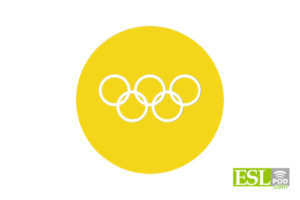 Have you been watching the Olympics?
Have you been watching the Olympics?
It’s fun to see such amazing performances by athletes.
How do they get to be so good?
The obvious answer is “practice.”
They spend thousands of hours working hard, improving a little bit everyday.
Will “practice” help you improve your English? Will spending time everyday at it make a difference for you?
Maybe yes. Maybe no!
It depends on what you mean by “practice.”
Let’s take the example of Chloe Kim, the American snowboarder who won a gold medal in her sport.
I’m sure Chloe practices by going down mountains of snow hundreds of times each week. That sort of “practice” helps her.
But if she “practiced” for snowboarding by eating a pound of potato chips every day, that would obviously NOT help.
You have to do the right kind of practice.
What is “practice” for improving your English?
Many people – teachers, students, random people on the Internet – think that “practice” means actually speaking English or writing emails or talking to themselves in the mirror or repeating what other people are saying (“shadowing”).
In applied linguistics, we call this sort of “practice” output. Output is what, well, comes “out” of something.
Language comes “out” of your brain – through your mouth (speaking) or your keyboard (writing).
There may be some benefits (good things) about a certain amount of output, but in fact the MAIN way of improving your language skills is not through output.
What really helps you is the opposite of output: input.
Input is what goes “in” your brain.
Getting more input is the RIGHT kind of practice for improving your speaking – even though you are not actually speaking!
What exactly do I mean by “input”?
It’s simple: LISTENING and READING.
What goes in your ears (listening) or eyes (reading) is much more important than any kind of output.
In other words, we get better at speaking not by speaking, but by listening and reading.
Think of it this way: your brain has to “get” language before it can “give” language. If you don’t focus on “getting” more input, you have nothing to “output”!
You have to put money INTO in your bank account before you can take money OUT of your bank account.
Reading and listening are like money you put in your brain’s “language bank account.”
When we study people who become really good at second languages, we find that ALL of them have “practiced” the language thousands of hours by doing these two things: lots of listening and (especially) lots of reading.
So if you’re looking for a gold medal in English speaking, you really do need to “practice” it everyday – even 15 minutes a day will help you.
But don’t sit on the couch (sofa) eating potato chips!
That’s the wrong kind of practice.
Instead, get lots of and lots of INPUT – listen and read as much as you can.*
That’s the way to “winning” better English.
~Jeff
*The input you read or listen to has to be something you can UNDERSTAND, however. It is no good listening or reading things that are too hard for you. That’s also a waste of time.
We have 450+ hours and more than 10,000 pages of understandable English in our Unlimited English program – you can find out more here.